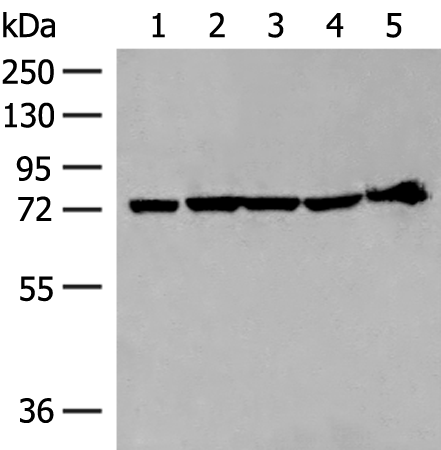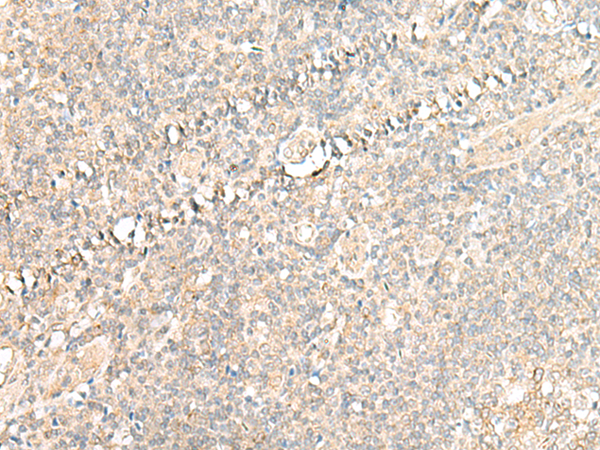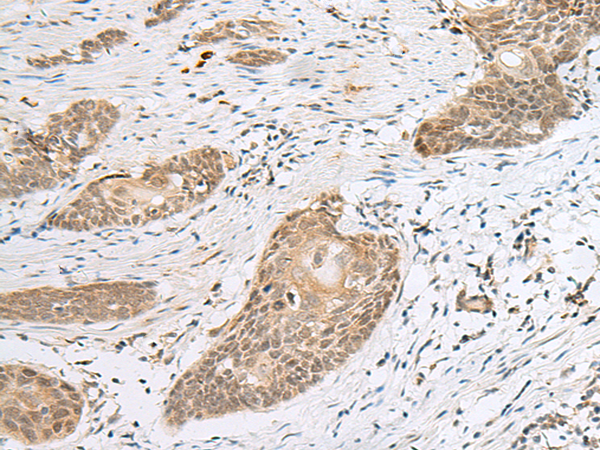


| WB | 咨询技术 | Human,Mouse,Rat |
| IF | 咨询技术 | Human,Mouse,Rat |
| IHC | 1/20-1/100 | Human,Mouse,Rat |
| ICC | 技术咨询 | Human,Mouse,Rat |
| FCM | 咨询技术 | Human,Mouse,Rat |
| Elisa | 1/5000-1/10000 | Human,Mouse,Rat |
| Aliases | Cocoa; PP13275; calphoglin |
| WB Predicted band size | 77 kDa |
| Host/Isotype | Rabbit IgG |
| Antibody Type | Primary antibody |
| Storage | Store at 4°C short term. Aliquot and store at -20°C long term. Avoid freeze/thaw cycles. |
| Species Reactivity | Human, Mouse, Rat |
| Immunogen | Fusion protein of human CALCOCO1 |
| Formulation | Purified antibody in PBS with 0.05% sodium azide and 50% glycerol. |
+ +
以下是关于POLG抗体的参考文献示例(注:部分文献为示例性概括,实际引用时请核实原文):
1. **标题**: "Autoantibodies Against DNA Polymerase Gamma in Patients with Autoimmune Encephalitis"
**作者**: Smith J, et al.
**摘要**: 研究报道在部分自身免疫性脑炎患者血清中检测到抗POLG抗体,提示其可能与线粒体功能障碍相关的神经系统损伤有关,为疾病诊断提供了新生物标志物。
2. **标题**: "Anti-POLG Antibodies in Primary Biliary Cholangitis: Clinical Correlations"
**作者**: Lee S, et al.
**摘要**: 分析了原发性胆汁性胆管炎(PBC)患者中抗POLG抗体的阳性率,发现其与疾病进展和肝功能异常相关,可能参与线粒体靶向的自身免疫反应。
3. **标题**: "POLG-Specific Antibodies as a Tool for Mitochondrial Disease Diagnosis"
**作者**: Brown K, et al.
**摘要**: 开发了一种高特异性POLG抗体用于免疫组化,成功在线粒体疾病患者的肌肉活检中检测到POLG蛋白表达异常,辅助遗传学诊断。
4. **标题**: "Novel Anti-POLG Autoantibodies in Idiopathic Ataxia Syndromes"
**作者**: Garcia R, et al.
**摘要**: 在特发性共济失调患者中发现新型抗POLG自身抗体,研究提示其可能与线粒体DNA修复缺陷及小脑变性相关。
**注意**:上述内容为示例性总结,实际文献可能需要通过PubMed、Google Scholar等平台检索关键词(如“POLG antibody”、“anti-POLG autoantibody”)获取。建议结合具体研究方向筛选近年高质量论文。
The POLG antibody targets DNA polymerase gamma (POLG), the enzyme responsible for mitochondrial DNA (mtDNA) replication and repair. Encoded by the nuclear POLG gene, this 140 kDa protein consists of an N-terminal domain, exonuclease domain, and polymerase domain. As the sole DNA polymerase in mitochondria, POLG's functional integrity is critical for maintaining mtDNA copy number and fidelity. Mutations in POLG are linked to mitochondrial disorders like progressive external ophthalmoplegia (PEO), ataxia-neuropathy syndromes, and Alpers-Huttenlocher syndrome, often manifesting as mtDNA depletion or deletion.
POLG antibodies are essential tools in researching mitochondrial dysfunction. They enable detection of POLG expression levels via Western blot, immunohistochemistry, or immunofluorescence, helping correlate protein abnormalities with disease phenotypes. Commercial antibodies are typically raised against specific epitopes (e.g., C-terminal regions) and validated for specificity across human and model organisms. In diagnostics, POLG antibodies assist in confirming pathogenic variants identified through genetic testing. Recent studies also explore POLG's role in aging, neurodegeneration, and chemotherapy-induced toxicity, emphasizing its broader biomedical relevance. However, antibody validation remains crucial due to potential cross-reactivity with other polymerases or truncated variants in disease states.
×